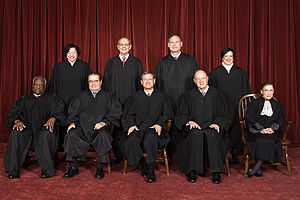
Who knew that broccoli, cell phones, burial insurance, electric cars, blue eyes, exercise, epidemics, wife beating, and hunting licenses were all related to the Affordable Care Act (ACA)? According to our nine Supreme Court Justices—well—according to eight of the nine justices (Justice Thomas as usual said nothing on the topic)—they are related. It’s not every day that the typical US citizen can listen in on Supreme Court hearings. I wasn’t there in person, but yesterday I read through the 130 pages of typed transcript of Day 2 of the hearings on the constitutionality of President Obama’s health care overhaul law. It made for surprisingly fascinating reading. Although at the end of it I am dismayed at the types of things the Justices’ said.
For example, Justice Scalia, the most talkative Justice in the transcripts—was responsible for Justice Breyer later dubbed “the broccoli possibility.” This is Scalia’s slippery slope argument, where he asked the Justice Department’s Verrilli what would keep the federal government from requiring all US citizens to buy and eat broccoli if the ACA individual mandate for health care coverage is instituted. Since Justice Scalia looks a whole lot like Danny DeVito and is vocal in his abhorrence of broccoli (and exercise), this analogy was not surprising. It is surprising how many more times it was invoked throughout the day’s proceedings—at least eight more times by various justices and by Verrilli, who at one point stated (I imagine in a fairly frustrated voice), “Broccoli is not the means of payment for anything else,”—thus trying to end the analogy of broccoli to health insurance.
There was a brief but very disturbing interchange between Justice Scalia and Solicitor General Donald Verrilli. Mr. Verrilli was talking about the US social norm of providing health care to people regardless of their ability to pay—as backing for the US federal laws requiring hospital emergency departments to treat patients regardless of health insurance status or other payment sources. Justice Scalia interjected, “Well don’t obligate yourself. Why, you know?” Mr. Verrilli attempted to reply that it was a deeply held social value of most Americans, that’s why, but Justice Scalia cut him off. Is health care in the US a right or a privilege? It would seem that Justice Scalia believes it is a privilege.
It is fascinating to remember that when the individual mandate for health insurance was first being debated in Congress three years ago, conservative Republicans (including current Presidential candidate Mitt Romney) were its staunchest proponents —touting it as the responsible thing to do and as a way to stop the freeloading bums from getting health care at the expense of everyone else. (see “Academic Built Case for Mandate in Health Care Law” by Catherine Rampell, NYT 3-29-12). Now that the individual mandate is part of the ACA approved by Congress and signed into law by President Obama—and because it is a Presidential election year—conservative Republicans are complaining loudly about how the individual mandate is unconstitutional. And 26 states (most all conservative states with Republican governors) have challenged the constitutionality of the ACA and convinced a conservative-majority Supreme Court to decide on the issue. This seems to me to be the biggest broccoli possibility of all—to have the US Supreme Court potentially dismantling a much needed if imperfect health care reform.

One thought on “The Broccoli Possibility”